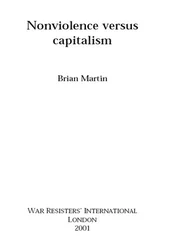Brian Martin
TECHNOLOGY FOR NONVIOLENT STRUGGLE
I thank all the individuals who offered insightful comments in interviews, seminars and correspondence, who for the most part must go unnamed. Robert Burrowes, Mary Cawte and Helen Gillett provided many useful suggestions on a first draft of the entire manuscript. Mary Cawte was an essential part of the project that led to this book. The project was supported by the Australian Research Council. Ellen Elster and Andreas Speck, members of the executive of War Resisters’ International, provided many insightful suggestions on the entire manuscript.
Wil Rikmanspoel offered expert advice on preparing the pdf version of the text.
Much of chapter 5 is adapted from “ Communication technology and nonviolent action,” Media Development, Vol. 43, No. 2, 1996, pp. 3-9. Chapter 4 in part draws on “ Science, technology and nonviolent action: the case for a utopian dimension in the social analysis of science and technology,” Social Studies of Science, Vol. 27, 1997, pp. 439-463. Chapter 7 is adapted from a portion of Helen Gillett, Brian Martin and Chris Rust, “ Building in nonviolence: nonviolent struggle and the built environment,” Civilian-Based Defense, Vol. 11, No. 3, Fall 1996, pp. 1, 4-7.
PROLOGUE
The Vision of Aldous Huxley
In 1946, a remarkable essay by Aldous Huxley entitled Science, Liberty and Peace was published. [1] . Aldous Huxley, Science, Liberty and Peace (New York: Harper & Row, 1946; London: Chatto & Windus, 1947). It has been reprinted by the A. J. Muste Memorial Institute, 339 Lafayette Street, New York NY 10012, USA.
Huxley (1894-1963) is widely known as a novelist whose most famous work, Brave New World , was published in 1932. He was also a prolific and eloquent essayist in diverse fields. Science, Liberty and Peace is filled with insights about the connections between science, violence and nonviolence. Considering how far in advance of others Huxley was on this issue, it seems worthwhile examining how he arrived at his conclusions.
Huxley’s essay begins with the point — quoting Leo Tolstoy from around the turn of the century — that if power in society is mostly in the hands of a few people, then control over nature through science and technology will serve to increase power inequalities. Huxley points out that in the 1800s, armed liberation might have seemed a reasonable prospect: barricades and sporting rifles could be used to resist the government’s cavalry and cannon. But with the development of weapons of mass destruction, people’s weapons were no longer a match for the violence controlled by the state. Similarly, modern methods of mass persuasion — notably the press and the radio — become tools for oppressors because they allow the few to manipulate the many.
Mass production, the very foundation of industrial society, has aided this process, Huxley argues. Centralised production is favoured by both governments and big business, and they put every obstacle possible in the face of decentralised production. In each of these developments — weapons, media and industry — science and technology have played a crucial role. The main thrust of science and technology thus has served oppressors and hindered the expansion of peace and freedom.
Huxley’s analysis of society and science can be traced back to one guiding principle: that power is corrupting. Huxley refers to Lord Acton, whose views on power are best known through the aphorism “power tends to corrupt and absolute power corrupts absolutely.” [2] . Since Huxley wrote this essay, several authors have written about the corruptions of power, including Alex Comfort, Authority and Deliquency in the Modern State: A Criminological Approach to the Problem of Power (London: Routledge and Kegan Paul, 1950); David Kipnis, The Powerholders (Chicago: University of Chicago Press, 1976); David Kipnis, Technology and Power (New York: Springer Verlag, 1990); Pitirim A. Sorokin and Walter A. Lunden, Power and Morality: Who Shall Guard the Guardians? (Boston: Porter Sargent, 1959). Kipnis’ work reports on psychological experiments that provide strong evidence for Lord Acton’s insight.
If power is corrupting, then all technologies and social arrangements that allow or promote concentrations of power should be resisted. Huxley’s preferred path is decentralisation, which reduces the potential for abuse of power.
Huxley favours a society fundamentally different from the one that existed in 1946. But how should change occur, given that the overwhelming powers of violence and mass persuasion are held by what he calls the “ruling oligarchy”? Huxley believes that nonviolence is the only way forward. He sees hope in Gandhi’s methods, called satyagraha but more commonly referred to in the west today as nonviolent action, and refers to the resistance by the German people to the French and Belgian occupation of the Ruhr in 1923.
Huxley argues for nonviolence as the only hopeful possibility given the power that science and technology, via modern weapons, has placed in the hands of oppressors. Huxley’s support for nonviolence can be interpreted as an independent principle of action to supplement his analysis based on the corruptions of power. But support for nonviolence is a logical consequence of an overall analysis based on the idea that power is corrupting. Nonviolent action, as a method of struggle, allows widespread participation, gives any individual only limited power over others, and is most compatible with decentralised activity. Nonviolent action, then, is the method of struggle against oppression that is least subject to the corruptions of power.
With his analysis based on the corrupting influence of power, Huxley is able to make many penetrating insights. For example, he notes that oil is unevenly distributed throughout the world. Therefore, it is susceptible to monopoly control, with wars being fought to acquire and maintain this control. [3] . This point has also been made by Godfrey Boyle, Living on the Sun: Harnessing Renewable Energy for an Equitable Society (London: Calder & Boyars, 1975).
The obvious implication is that building an energy system around oil makes society prone to inequality and war.
Huxley also makes the point that nuclear power is complex and potentially destructive and therefore a bad option. He prefers instead the development of regional energy self-sufficiency, which would minimise the social power held by any group.
The modern warfare state needs a strong capital-goods industry and also the capacity to mobilise the entire population, either in the military or in industry, for war. Huxley was well aware of this process during World War II. This universal mobilisation is easiest when the population consists largely of rootless, propertyless employees who depend on the state for vital services. Another value of large industry, from the point of view of the state, is that it is much easier to tax than small decentralised manufacturing.
Huxley also makes some important general points. He laments the disastrous effects of nationalism; he notes that preparation for war is useful to the holders of centralised political power; and he says that socialist states combine the worst aspects of centralisation of power.
Most of Huxley’s insights are fully relevant more than half a century after they were first published. The 1991 Gulf war is only the most recent example of a war fought over control of oil supplies. Huxley’s concerns about nuclear power and his support for decentralised energy sources were taken up in a major way beginning in the 1970s. As for the process of mobilisation for warfare, it is certainly the case that many populations around the world are even more rootless and dependent on states than in the 1940s. Huxley’s comments about the danger of nationalism are still relevant today. The cold war is testimony to his point that mobilisation for war serves the interests of political elites. [4] . This point was also made most powerfully in the opening of Herbert Marcuse, One Dimensional Man (Boston: Beacon Press, 1964).
The failures of socialist states are now widely apparent.
Читать дальше












